The broken laptop, at least, I could do something about. Once again, my busted machine was too obsolete to be worth the cost of having it professionally repaired. I’d have to replace the HandBook. This time, I decided I’d buy two replacements–a fairly modern laptop, the best I could afford, with a color screen, a 486 microprocessor, and a high-speed, internal modem, so I could use it as a desktop replacement for my elderly Tandy 1000TX and go on the Internet. And I’d also get myself an ultra, ultra portable, a machine one-third the size of my three-pound HandBook.
The desktop replacement ended up being a used NEC Ultralite Versa V50. A competent enough machine, but nothing special, nothing particularly exciting; certainly a big comedown from the original NEC Ultralite. Now that, in its day, had been a dream machine, the first aesthetic masterpiece of laptop design, a piece of work that belongs in the Museum of Modern Art. Introduced in 1988, costing over $3,000.00 in its base configuration (and that’s without the optional floppy drive!), it was definitely aimed at the “executive toy” market. It weighed just 4.4 lbs, less than a third of the typical laptop of its day. Plus, it was sleek–jet-black, less than two inches thick, with a keyboard, screen, and built-in speaker that would’ve looked at home on the starship Enterprise (the refurbished version from the first couple of movies). To me, sitting in my office at Sagamore Children’s Psychiatric Center at the tail end of the eighties and reading my boss’s Computer Shopper magazines, the future had arrived, and it looked good. Well, that’s not the machine I bought in 2007. Later, after I had come down with a severe case of collectivitis, I would buy three of them.
Now, the other machine I bought that year, the ultra, ultra portable? That one ended up being a keeper. The Poqet PC. My all-time favorite vintage portable computer. Introduced in 1989, just a year after the NEC Ultralite came out, the Poqet trumped the Ultralite by being less than one quarter as heavy–one single solitary pound. Unlike its slightly later competitor, the Gateway HandBook, it ran on just two AA batteries (alkalines neither required nor recommended), not six; and it would run for up to forty hours on those two disposable batteries, not the three or four hours the Gateway’s alkaline battery pack might provide. It was the first ever “instant on” machine; pressing the On/Off button put it into sleep mode, and a built-in capacitor, combined with the AA batteries, would retain data and programs in the computer’s random access memory for up to a month. It more permanently stored data on two optional SRAM cards. Various software companies–including WordPerfect, I discovered with joy!–had issued programs on special ROM (Read Only Memory) cards for the Poqet.
The original Poqet PC Corporation had lasted as an independent concern just three or four years before being bought out by Fujitsu. Then Fujitsu only bothered to develop one additional model before inexplicably abandoning the Poqet PC line. A company called California Digital had bought up all the remaining stock from Fujitsu, which consisted of Poqet Classics (the first model, with 520K memory, a reflective screen, and running on two AA batteries), and Poqet Pluses, the model that had been developed by Fujitsu (slightly larger and heavier, with 640K memory but running on proprietary rechargeable batteries). I was spooked by the notion of relying on proprietary batteries made by a company that had so quickly abandoned its product, so I ordered me a Poqet Classic. I believe I paid a tenth of the machine’s original $1,999 retail price. It ended up being one of the best purchases I ever made.
Its crowning glory, apart from that amazing battery life on just two disposable AA batteries (not even the alkaline kind!), was its keyboard. I simply loved (and still love) that tiny keyboard. If you’re not a touch typist, the feel of a machine’s keyboard doesn’t matter much. But if you are, the keyboard’s feel, the tactile feedback it provides to your fingertips and to the muscles in your hands, will either make or break the machine for you. Either you’ll be happy to use it and come to love it as a member of the family, or you’ll loathe it and obsess about trading it in for something different (kind of how Amanda felt about me in the months leading up to our separation–must tie the disparate elements of this essay together!).
The Poqet’s keyboard and my fingers were a match made in clicky-key heaven. After playing with it for less than an hour, my fingers felt completely at home. I had bought a one megabyte SRAM card to use for programs and data storage (I wouldn’t track down the rare and elusive WordPerfect ROM card until several years later). I could get WordPerfect version 5.1 to run off the SRAM card, but I didn’t have much space left over for my own data files. Also, I found that I couldn’t open up two files simultaneously within the confines of the Poqet’s skimpy 520K of memory, which made cutting and pasting between documents an impossibility. My solution? I still had a pirated copy of the earlier version of WordPerfect, the venerable version 4.2. In terms of basic word processing, it did 95% of what version 5.1 would do; the big difference was that the newer version supported rudimentary graphics files and scaleable fonts. I didn’t need such frippery on the Poqet, no, sir! By judiciously selecting only the most absolutely necessary program files of WP version 4.2 to load onto my one megabyte SRAM card, I left myself about 400K of space for data files, enough to hold around a dozen chapters of a novel.
As soon as the Poqet arrived in the mail, I measured its dimensions, then went online to a company called The Pouch that made custom-fitted carrying cases for laptops and palmtops, including discontinued models. I ordered myself a holster-style case that I could clip onto my belt. Another excellent buy. That original Pouch, made out of a stretchy, wetsuit-like fabric, has lasted me more than a dozen years, much of that time involving daily use, and it hardly looks worse for the wear. It has protected my each of my successive Poqet PCs from harm, cushioning them against falls and scrapes. I would happily and proudly serve as late-night TV pitchman for the product. Admittedly, as a marker of nerddom, my Pouch has few equals (at least I ordered it in black instead of fushcia). Some people mistook the Pouch for a sidearm holster. So–who knows?–the Pouch and my Poqet PC may have warded off a mugger or two on the dicey streets of New Orleans, particularly on those nights when I stayed late at the State Office Building.
During those months following my separation and divorce, I was concerned with a whole lot more than replacing my Gateway HandBook. My first priority (aside from just making myself crawl out of my lonely bed each morning) was to do everything possible to rehabilitate my ankle. My orthopedist warned me that, six months following the removal of the cast, whatever flexibility I had managed to recover would be what I’d be stuck with for the rest of my life. So I joined the Loyola University gym and started swimming and walking the inside jogging track daily.
For the first time since my work at the Tulane Hillel Center, I began attending synagogue every Shabbat. I dug down as deeply as I could in therapy (I’d begun seeing a therapist about six months before my separation, but now the threatening jaws of severe depression made frequent sessions seem way more imperative). I began to think about maybe taking up sailing, taking lessons on Lake Pontchartrain. My grandfather had known how to sail a small boat. I spent as much time as I could with friends, especially the old gang at Borsodi’s Coffeehouse. And, five months after my separation, I went to the local Jewish Community Center and signed up as a beta tester for their trial matchmaking program. I began, tentatively and awkwardly, to meet new women.
One of those women was a young, raven-haired geology grad student named Lila, who inadvertently gave me the idea for Fat White Vampire Blues (I’ve posted the story of that peculiar circumstance here). I started dreaming up that book’s world and characters at the same time my life underwent a fairly radical change. Due to my depression having taken a significant turn for the worse, my doctor put me on an antidepressant. Nowadays, popping a daily Prozac seems to be as common as taking a daily aspirin to ward off a heart attack. Not so much in 1997. Going on an antidepressant felt like a big deal; it wasn’t as talked about and accepted as it would become just a few years later.
A common reaction for someone who goes on a serotonin uptake inhibitor like Prozac for the first time is a period of being very, very up. Let’s call it what it is. Mania. When you’ve spent most of your previous life with a wet blanket draped over your emotions, for so long that you figure a sodden blanket is simply what “normal” feels like, and then all of a sudden that wet blanket is whipped away, you feel fifty pounds lighter. You start smiling at strangers’ babies. You think about hugging the parents, and the counter lady who brings you coffee. And the FedEx guy. And you begin making plans. Lots and lots of plans. Big plans.
Which may at least partially explain why, not long after, I bought 250 vintage laptop and palmtop computers in less than a two year span, spending close to thirteen thousand dollars, and piling so much weight of plastic and metal and silicon on utility shelves that I cracked the floor of my ninety year-old Uptown cottage.
But I’m getting ahead of myself.
Women. The Prozac made it easier for me to approach women. Oddly enough, so did the Poqet. It was cute. It was a conversation starter. Writing my novel on it at a coffeehouse was the equivalent of having a small, pampered dog on my lap. . . certain women were instantly charmed. At least, odd technophile women from exotic foreign countries. All right, I’m exaggerating. Just one odd technophile woman. From Canada. Carole. With the accent on the final syllable, hard O. Like “kaiser roll.”
One summer Sunday morning, I walked over to my local CC’s Coffeehouse at the corner of Magazine Street and Jefferson Avenue in Uptown New Orleans, my Poqet in its Pouch swaying snugly on my belt. I hadn’t bothered to shave or put on decent clothes. I planned to buy myself a bagel and coffee, then work on a chapter from my vampire novel.
I didn’t get very much work done that morning. There was a woman at the next table, an attractive woman of indeterminate age, a little older than me, possibly in her thirties, possibly in her forties, with a huge nimbus cloud of frizzy red hair framing a face with large, expressive green eyes, who was staring at my Poqet. Newly fortified with Prozac-propelled chutzpah, I asked her if she wanted to take a look at it. She did. She came over to my table and sat down. I told her all about the Poqet. She told me she’d come from Montreal to finish up her doctorate degree in linguistics at Tulane University, where she worked as an adjunct professor. She happened to be shopping for a small notebook computer on which to write her dissertation. I told her the Poqet was probably too primitive and limited to meet her needs, and I suggested several worthy alternatives. Before I could begin dusting off my wretched high school French, we were having lunch by the water in Bay St. Louis, Mississippi.
That was the start of a tumultuous, chaotic, but mostly fun six month relationship. Based on my recommendation, she bought herself a Panasonic Toughbook sub-notebook computer. She admitted that her command of written English wasn’t that good. She asked if I would look over her dissertation. I did, of course. Ultimately, she paid me five hundred dollars to rewrite the whole thing. I knew bupkis about linguistics, but I was able to reframe her main thesis in such a way that it made her research results look much stronger. Her dissertation was then accepted by her academic committee. Knowing how much I’d contributed to it and how my prior knowledge of the field of linguistics had been pretty much limited to the phonics pedantics of Sesame Street and Schoolhouse Rock, my respect for the standards of higher academia took a nose dive.
I’d like to say we evacuated from New Orleans together under the threat of Hurricane Georges, but we didn’t. Carole refused to leave her apartment. She clung to a nutty, romantic idea that if the hurricane was fated to kill her, it would find her no matter where she went, so why leave all her beautiful things behind? Muttering under my breath, I stayed with her, and together we listened to occasional gunfire on not-so-distant Uptown streets before the hurricane watch was lifted.
We talked a lot about kids. She loved children and wanted some of her own very badly. I also wanted a kid pretty badly. But there were a couple of roadblocks. Carole was Catholic, and I had recently reaffirmed the importance of my Judaism, had gone kosher, and was chewing over the possibility of enrolling in rabbinical school; my first wife had been Baptist, and I didn’t want to repeat the whole mixed marriage thing again. More significantly, as matters turned out, Carole hated how I dressed. She especially loathed my Godzilla and comic book character teeshirts. She went on and on about how stylish her former boyfriend had been, and she dragged me to upscale malls and harangued me into buying some new things.
We came to an understanding. She would agree to convert to Judaism if I would get rid of all my ugly clothes. I finished rewriting her dissertation. Then, after I’d completely scoured my wardrobe, she dumped me to go back with her ex-boyfriend, with whom she subsequently broke up and got back together with at least five times. I know this because she insisted on keeping in touch, until she finally gave up on her ex-boyfriend and Tulane and New Orleans and moved back to Montreal.
Oh, I took my little writer’s revenge. I based the character of Maureen, Jules Duchon’s longtime lover in Fat White Vampire Blues, on her. Not physically, but personality-wise. Reading back through that novel, recognizing Carole in Maureen, I realize how narrowly I’d dodged a bullet. Thanks, stylish ex-boyfriend, wherever you are.
Much of Fat White Vampire Blues was written in my initial surge of Prozac-fueled feistiness, reinvigorated passion for life, and near mania. Most of my prior fiction had been, in retrospect, somewhat emotionally constipated. Not the new book. I let ‘er rip. Damn the torpedoes! Full speed ahead! Perhaps Jules is just a little politically incorrect? Pump up the volume! Put your heretofore personal, hidden sexual fetishes on full, garish display? Why the hell not? You only live once! Have your viewpoint character engage in intimate relations with a stray dog? I’m not interested in books with good taste, just books that taste good!
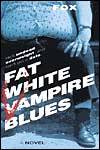
And you know what? It worked for me. I cut loose, and even though the book was about a silly, obese vampire, it ended up being the most honest and vital writing I had ever done. Even though I based the superficial aspects of Jules Duchon on one of my coworkers at the Office of Public Health, Jules Theobold, my protagonist’s deepest struggles were based on what I was going through myself. He was a guy who was being forced to abandon a comfortable rut of long duration, to change his conception of himself, to take risks, to learn new skills, to man up. He was also a guy in mourning for a love he’d lost. Fat White Vampire Blues was my post-divorce recovery book.
The first day of 2000 came and went without Y2K bringing about the end of the world. It didn’t even cause a hiccup on my fairly ancient Poqet PC. Following my split from Carole, I’d dived into computer dating on JDate.com with a fierce determination. A year’s worth of shooting messages into the Internet void hadn’t produced much in the way of results, however. The Jewish women in New Orleans who placed themselves on JDate.com never seemed to respond to my queries. The only responses I got were from the far corners of the Gulf South, small cities with minuscule Jewish populations. I gamely took weekend trips to Jackson, Mississippi, Birmingham, Alabama, Lafayette, Louisiana, and Atlanta, Georgia (okay, not a small Southern town, that one), but none of my geographically remote connections clicked.
I resigned myself to the possibility that I might never get married again, that I might never have a family of my own. My grandmother passed away and left me the proceeds of an insurance policy. I decided to take advantage of then relatively cheap housing prices in New Orleans and put a down payment on a home of my own. Why put it off any longer, I figured? If I was to be alone for the rest of my life, I might as well be alone in a home I could make entirely my own, not dependent upon the whims of a landlord.
I found a small house, about 1100 square feet, in Uptown New Orleans, not far from my current apartment and in easy walking distance to the local CC’s Coffeehouse where I did most of my writing. It was a ninety year-old former double shotgun that had been converted into a single dwelling, constructed in the traditional raised-up-on-posts New Orleans style, a precaution against flooding. It was located just off Magazine Street, on the “wrong” (i.e.: predominately African American) side of the street but on a block that looked reasonably well cared for.
The current owners, a family with two young daughters, didn’t mention to me that I’d be moving in next door to the neighborhood’s primary drug dealer, and that his customers would come by in the middle of the night knocking on his side windows (adjacent to my bedroom) and shouting to be let inside. But I suppose, had I been in that couple’s shoes, I wouldn’t have mentioned it, either. Indeed, when I sold the place myself a few years later, I followed their sage example and said as little as I could to prospective buyers about my immediate neighbor. Caveat emptor.
Although the house was on the small side, to me it seemed cavernous, compared to the shotgun apartments I’d been living in. I had the peeling exterior repainted a brilliant sky blue. And then I began wondering what I would fill up the interior with. Since the house had originally been built as a double shotgun (boy, had those units been tiny!), it had two front parlors. The lefthand parlor had a huge picture window and seemed ideal to serve as a showcase of some kind. But what to showcase?
The idea hit me like a meteor that landed with an eruption of Mephistophelean sulphur.
Laptops, by George! Vintage laptops!
Next: I get hooked on eBay and come down with a severe case of collectivitis. I justify my out-of-control buying by planning to write a book on the hobby of collecting vintage laptops. I secretly plan to corner the market. I believe my own bullshit. I blow wads of cash. I begin filling up my house with laptops.



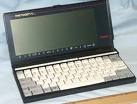

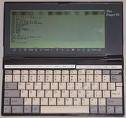
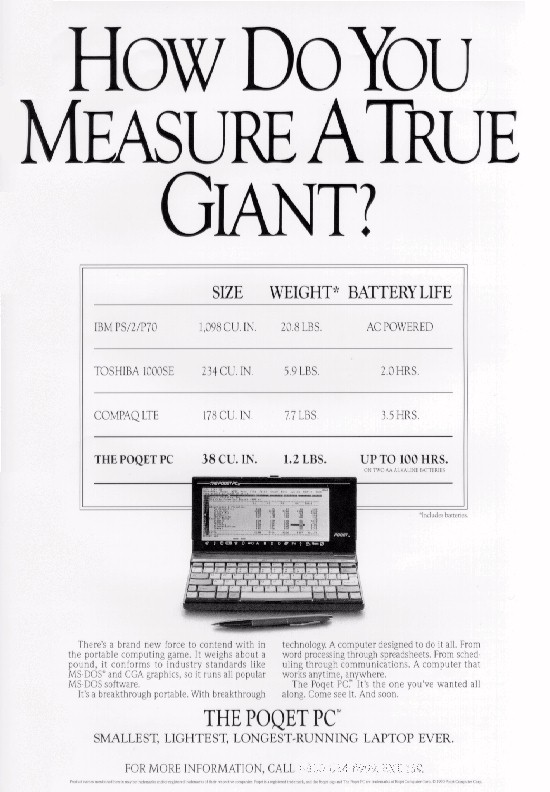
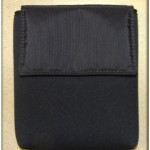
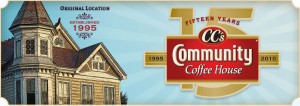

Ah, computer nostaligia, how sweet it is. I came to your site through my interest in Philip Wylie, but am really enjoying your laptop chronicles.
I don’t think the Poqet was the first instant-on laptop. My Epson Geneva PX-8, which I purchased in 1985, had that feature, as did the Cambridge Z88, which was the U.S. version of the Sinclair Z88, circa 1988.
dennishopperbook.com
Peter, thanks so much for visiting. I’m glad you’re enjoying my vintage computer articles. I’m sure you’re right about the machines that you cite; however, I believe the Poqet PC was the earliest PC compatible to have an “instant on” feature. Take good care!
Andy, the nostalgia these essays fill me with is something I treasure; that and an almost heartbreaking wistfulness.
Hey, that’s why I write them, my friend.